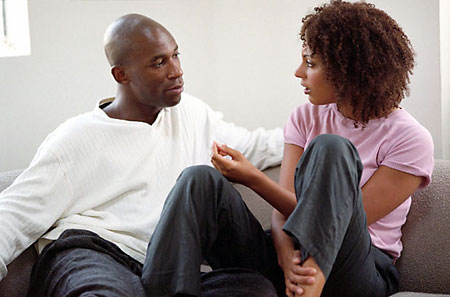Common reactions to hearing loss

Hearing loss changes our relationship with the world because we no longer hear some of the things we used to. It can also change the reactions of how other respond to you.
It changes the way we relate to our families and they to us. And partners, friends and family members who known us for many years may not know how to respond to your new needs.
Stages of adjusting
Now all that has changed and we are not quite the people we were. Just as we may grieve for our lost hearing, they too, may want to grieve for the person they have lost.
Just as we may find our lives full of wonderful experiences we would not have had if we had not been deaf – changing career, becoming the owner of a hearing dog, speaking in public, sitting on the committee of a charity for deaf people – so they also may be excited and proud of the new people we have become.
Here are a few examples of how hearing loss changes things:
‘I don’t see a lot of my family. I don’t think my daughter realises how deaf I am. I can tell when she gets impatient with me from her body language. She says ‘You’re upsetting me mum.’ I reply ‘No-one can upset you except yourself.’ When my brother comes to visit, if I don’t hear the doorbell, he goes home without seeing me. The rest of my family don’t seem to notice my hearing loss. I think they’re in denial about it. I think they always have been.’
Some families react like ostriches about deafness. I mean by that they try to deny that the person they love has a hearing loss. Perhaps the reality is too painful to face; perhaps they hope that if they ignore it, it will go away; perhaps they simply do not understand the implications of hearing loss. Whatever, their reasons the practical implications of their attitude makes life very difficult for a deaf person.
‘A supportive partner makes a huge difference. In a recent report I read, it said that the hearing partners of people with hearing loss were not able to cope. It said that the relationship breaks down. Relationships may change in middle age. The man has perhaps been the main breadwinner and he’s used to being the dominant partner and then when he loses his hearing, the woman has to take over. She gains in confidence as he loses. Perhaps she thinks of him ‘I don’t need you any more.’
If you do not acknowledge that someone is deaf, you may forget to look at them when you speak, to get their attention before beginning a conversation or insist on trying to talk about something important while walking along a busy, noisy road. You may get angry with the deaf person for ‘not paying attention’ or ‘hearing what you want to hear’. Deaf people often tell me, that their family can be more inconsiderate about their deafness, sometimes, than a complete stranger. Such attitudes can put a severe strain upon family relationships.
‘When I’m with the family and they’re talking I miss so much.’
Changing dynamics

Hearing loss can change the dynamics of family life. A previously shy partner may suddenly find that they are the ones who have to make the telephone calls, talk to strangers, and buy tickets, because they are the ones with the hearing.
Children who previously went to one parent about their homework may now go to the hearing parent because it is ‘quicker and easier’ than trying to ask for help from dad.
A deaf family member may miss out on the chatting, joking, gossiping and quarrelling that are such a vital part of family life.
Here are a few examples of how a change in dynamics:
‘I used to be very reluctant to go out. If I went out for a meal or anything I would want my husband with me so I could say to him, ‘What was that, I didn’t catch that?’ if I couldn’t understand what someone said to me. He acted as my ears, really.”
Friends may take to using the hearing person as a sort of interpreter ‘Would Tracy like a cup of coffee?’ (The correct answer to this is ‘I don’t know, you ask her.’). Hearing children may be asked to be very responsible for their years and can find themselves having to make a telephone call or relay information. All these things can be positive as well. I once heard a triumphant youngster explain how she had just got a job because her communication skills, honed through years of living with a deaf mum, were excellent!
‘One of the things I heard was my sister saying ‘Don’t worry about her, she’s stupid.’ I hadn’t realised what people were saying about me. It was awful to think that people thought I was stupid just because I couldn’t hear.’
Reactions of children
Although many of us find that our families our very proud of us and our achievements, some may use deafness as an excuse for showing us disrespect. Teenagers, who sometimes find parents embarrassing anyway, may latch onto our deafness as the reason we are embarrassing – instead of our dress sense or terrible hair style.
‘I used to have the TV up too loud and so that became a bone of contention. Now that I have digital hearing aids she thinks my hearing is so much better that I have never had a problem really.’
The home may be filled with special equipment – a flashing light doorbell, a vibrating smoke alarm, and subtitles on the television. Some families may view these things with relief: because the flashing light doorbell is there, they no longer have to worry that we will miss an important caller; because we have a special smoke alarm, they can stay with friends for a sleepover or go that conference knowing we are safe; because the television subtitles are on, they no longer have to give a running commentary on our favourite programme. But for some, the equipment is a symbol of our deafness and they dislike and refuse to allow it in the house. How often have I heard ‘I can’t use the subtitles because my wife says they spoil the programme for her?’
‘My sister was very protective – almost smothering. When I was nine I told her ‘You stop doing it’. It did not go down well.’
‘My mother never wanted me to train as a nurse; she didn’t think I could do it. She thought it would be a good idea for me to work in a factory. She’s very proud of me now, though.’
Deaf teenagers and young people like any other people want to go to college, to travel, to have their own place, to get a job, hang out with their friends. They want to live their own lives and be independent but sometimes families, with the best of intentions, try to prevent this by being over-protective. You have to let go of a child’s hand so that they will learn to walk unaided. Letting go of a deaf youngster is the same. We will never know what we can achieve until we are on our own.
Deafness in the family means the beginning of a new life – for all of us.
The quotations here come from the people Val Tait interviewed for her book: ‘Life after hearing loss: Telling it like it is.’ Thanks to them for their honesty and co-operation.
Webpage updated: April 2024
